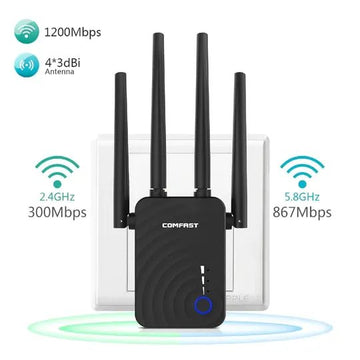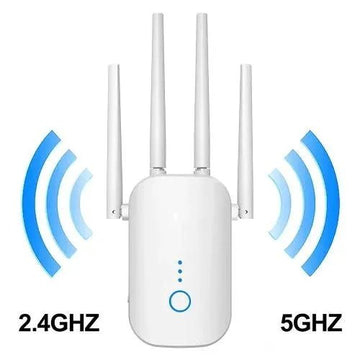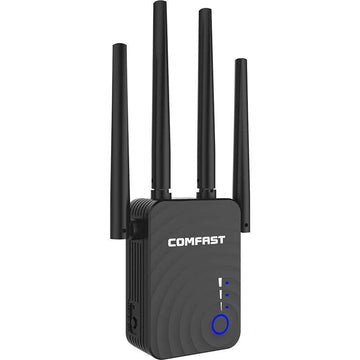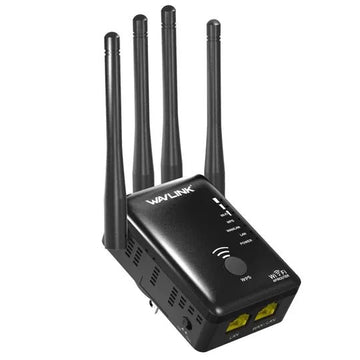Are There Any Limitations to Wifi Boosters? Understanding the Pros and Cons
In today's digitally connected world, a reliable and fast Wifi connection has become an essential requirement for both personal and professional use. However, many individuals and businesses struggle with weak or inconsistent Wifi signals, leading them to explore solutions such as Wifi boosters. In this article, we will delve into the world of Wifi boosters, understanding their pros and cons, and shedding light on any limitations they may possess. By the end, you'll have a comprehensive understanding of whether a Wifi booster is the right choice for enhancing your internet connectivity.
What Is a Wifi Booster?
Before we dive into the limitations and advantages of Wifi boosters, let's first define what they are. A Wifi booster, also known as a range extender or repeater, is a device designed to amplify the existing Wifi signal, thereby expanding its coverage area. It acts as a bridge between your wireless router and devices, capturing the router's signal and rebroadcasting it to areas where the signal strength may be weaker.
The Pros of Wifi Boosters
1. Extended Wifi Coverage
One of the primary advantages of using a Wifi booster is its ability to extend the coverage area of your wireless network. By placing the booster strategically, you can eliminate dead zones and ensure a strong and consistent signal throughout your home or office. This is particularly beneficial in large spaces or buildings with multiple floors, where the router's signal may struggle to reach certain areas.
2. Easy Installation and Setup
Wifi boosters are generally user-friendly devices that require minimal technical knowledge to set up. Most manufacturers provide detailed instructions, and some even offer mobile apps that guide you through the process step by step. With just a few simple steps, you can have your Wifi booster up and running, providing you with an enhanced wireless experience.
3. Cost-Effective Solution
Compared to alternative solutions such as upgrading your internet plan or installing additional routers, Wifi boosters offer a cost-effective option for improving your Wifi coverage. They are typically more affordable and require no additional monthly fees. Investing in a Wifi booster can save you money while still providing a noticeable improvement in your internet connectivity.
4. Compatibility with Multiple Devices
Whether you're using a smartphone, tablet, laptop, or any other Wifi-enabled device, a Wifi booster can enhance the signal for all your devices simultaneously. This versatility makes it an excellent choice for households or offices with multiple users and a wide range of connected devices.
The Cons of Wifi Boosters
While Wifi boosters offer various benefits, it's essential to consider their limitations before making a decision.
1. Signal Degradation
Wifi boosters can sometimes face limitations, particularly when it comes to signal degradation. These boosters work by capturing and rebroadcasting the existing signal, which can result in a slight loss of signal quality. However, modern boosters are designed to minimize this degradation as much as possible. To ensure the best performance, it is essential to select a high-quality wifi extender that is known for its reliable signal amplification and minimal loss of signal quality. By choosing a reputable device, users can mitigate the impact of signal degradation and enjoy an enhanced wifi experience with improved coverage and connectivity.
2. Bandwidth Sharing
When using a Wifi booster, the available bandwidth is shared between the router and the booster, potentially leading to a reduction in overall network speed. This becomes more pronounced if multiple devices are connected simultaneously and consuming high-bandwidth activities such as streaming or online gaming. It's essential to manage expectations regarding network speeds when using a Wifi booster.
3. Placement Challenges
To achieve optimal results with a Wifi booster, it is crucial to carefully consider its placement. Finding the perfect spot may involve a trial-and-error approach, where weak signal areas are identified and the booster is strategically positioned for maximum coverage. Furthermore, the booster's effectiveness can be hindered by physical obstacles like walls or floors, which can limit its range and overall performance. Taking these factors into account ensures a successful and efficient Wifi boosting experience.
4. Dependency on the Router
The effectiveness of a Wifi booster is closely tied to the quality and strength of the original signal emitted by the router. Even though the booster can amplify and extend the signal, if the router itself is outdated or unable to provide a strong and reliable signal, the booster's capabilities may be hindered. In such scenarios, it becomes necessary to consider upgrading the router in conjunction with implementing a Wifi booster to achieve the best possible results. By ensuring a robust signal from the router, the booster can effectively enhance the coverage and range, resulting in improved Wifi connectivity throughout the desired area.
Conclusion
Wifi boosters can be a valuable tool for enhancing your Wifi coverage and eliminating dead zones. They offer extended coverage, easy installation, and cost-effective solutions for improving your internet connectivity. However, it's essential to consider their limitations, such as potential signal degradation, bandwidth sharing, placement challenges, and dependency on the router's quality. By weighing the pros and cons, you can make an informed decision regarding the implementation of a Wifi booster in your home or office.




